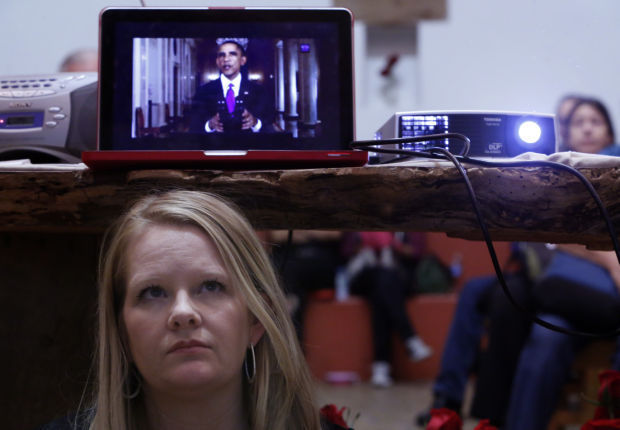The Rev. Alison Harrington remembers when she gave her first sermon.
Six students at the University of California — Berkeley had camped out, in a peaceful demonstration, in front of the president’s office. They were on a hunger strike, demanding the university establish an ethnic studies program.
Instead of meeting with the students, the university sent in the police, dressed in riot gear. Harrington was one of the six students.
Before the students were taken away, they asked her to say something. Harrington, who had been reading scripture that day, agreed.
“I spoke to the fact about what was right and just,” she said. “I look back at that as my first sermon.”
In the midst of a social struggle alongside others, seeking justice through nonviolent action on behalf of others, guided by the moral compass of scripture, Harrington had discovered her spiritual calling.
“I could speak clearly and passionately about issues of faith,” said Harrington.
After several years working as a community organizer, Harrington, the daughter of two preachers, entered the San Francisco Theological Seminary and became a Presbyterian minister. In 2009, the Rev. Harrington arrived in Tucson to be the pastor of Southside Presbyterian Church, which had been led for 35 years by the Rev. John Fife, and had made an impact locally and nationally in its commitment to social justice.
Harrington was not intimidated by the challenge. She relished the opportunity to lead the active and committed congregation. “Even on the hard days it’s a blessing,” she said.
She exceeded everyone’s expectations.
Last month the Center for American Progress listed Harrington as one of this country’s 15 faith leaders to watch. The nonpartisan, progressive organization cited Harrington for her work in resurrecting the national sanctuary movement and for her “important witness against indifference.”
Harrington called the national shout-out humbling and overwhelming.
“It’s more of a recognition of the shared ministry and work. I don’t do it alone,” said Harrington. We talked inside the church’s iconic kiva at South 10th Avenue and West 23rd Street, in the heavily Chicano and Native American neighborhood south of Santa Rosa Park.
Harrington and the congregation practice what she calls “radical hospitality.”
One clear example is that Southside welcomed two undocumented Mexican immigrants — Daniel Neyoy Ruiz and Rosa Robles Loreto — to seek sanctuary, and avoid deportation and separation from their families. Neyoy’s deportation order was lifted but Robles remains in sanctuary six months after she entered Southside.
“She’s very strong and very committed,” Harrington said of Robles, a mother of two.
Harrington, who is married and the mother of two children, could describe herself the same way. In addition to helping expand the sanctuary movement, Harrington has supported the day laborer program at Southside and has engaged with community organizations across town and Arizona in seeking humane immigration policies.
Fife said Harrington brought excellent organizing skills, youthful energy and “outstanding” preaching.
“She’s doing a magnificent job and has exceeded my expectations,” said Fife, who remains active in the community and at Southside.
The Rev. Randy Mayer, lead minister of The Good Shepherd United Church of Christ in Sahuarita, said one of Harrington’s strengths is “listening to voices often not heard and lifting them up.”
Harrington, he added, can articulate clearly the despair and dreams of her congregation and the wider community. In doing so she’s built up a lot of trust.
Unlike some other pastors and ministers, Harrington said, she can preach about justice, or the lack of it, in strong, coherent terms.
“I can talk about Michael Brown and Eric Garner,” she said. Unlike the large majority of Presbyterian congregations which are white, and middle- to upper-class, Southside is not and its congregants are more likely to have a personal connection to acts of injustice.
People of faith need to put their faith into action, she said. That is what motivates Southside and her ministry, she added.
“I don’t see us as a political church,” Harrington said. “I see ourselves as a pastoral church. We speak out on social justice.”
“That struggle for justice is long,” she said, “and we need faith to sustain us.”





